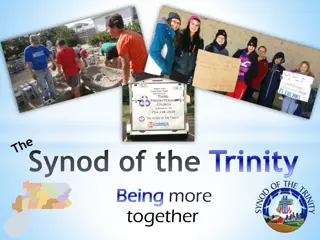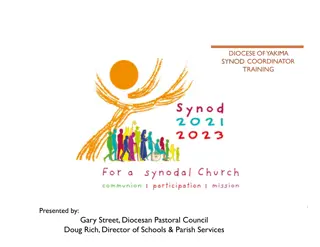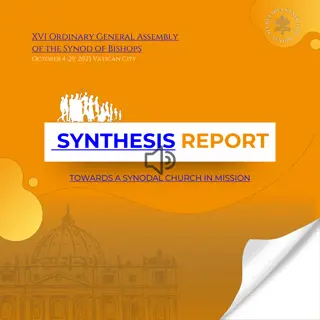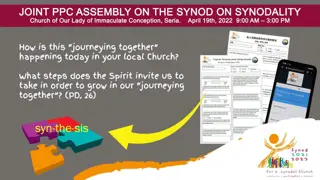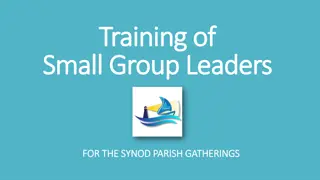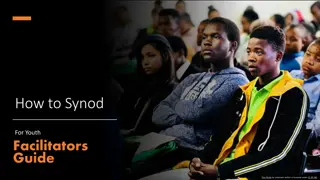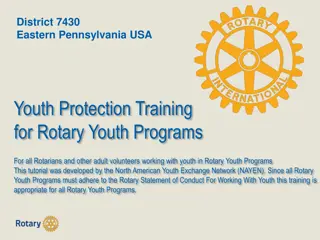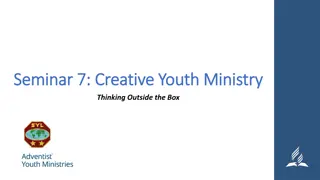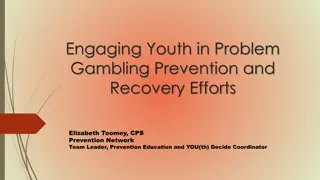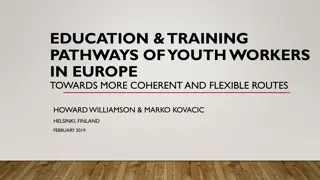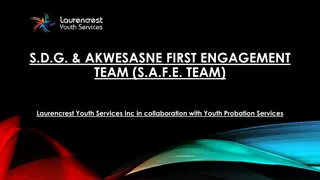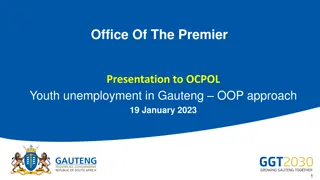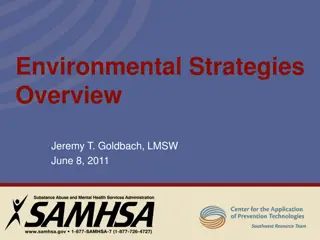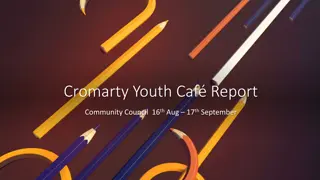Engaging Youth in the Synod Process: Recommendations and Strategies
Engaging youth in the synod process is crucial for the Church. This article emphasizes creating inclusive spaces for youth to share honestly, choosing advocates wisely, and tailoring communication to their developmental stages. Recommendations from teens stress the importance of authenticity, active listening, and creating safe environments for open dialogue.
Download Presentation

Please find below an Image/Link to download the presentation.
The content on the website is provided AS IS for your information and personal use only. It may not be sold, licensed, or shared on other websites without obtaining consent from the author. Download presentation by click this link. If you encounter any issues during the download, it is possible that the publisher has removed the file from their server.
E N D
Presentation Transcript
How to Synod with Youth Introduction This Photo by Unknown author is licensed under CC BY-ND.
The goal of the Synod is to engage all persons. Ensuring that youth are a part of the process and conversation is essential. The Opportunity To be a catalyst for conversion through the witness of the People of God
TheBig Question(s) How does this journeying together" take place today on different levels (from the local level to the universal one), allowing the Church to proclaim the Gospel? and what steps are the Spirit inviting us to take in order to grow as a synodal Church?
Communicating with children, adolescents and young adults must be tailored to their developmental stage and their cultural reality. The Context We have asked these questions before but often as a Church we have not responded in ways that engendered trust in the community.
1. Acceptance that only the most motivated of youth will speak out honestly in front of adults 2. Creation of Developmentally appropriate and non-judgmental spaces for sharing 3. Communication with parents and care givers to facilitate an at-home process 4. Create opportunities that will allow youth access process outside of their parish 5. The choose your messengers wisely 6. Do not assume privacy or interest 7. Manage your verbals and non verbals The Recommendations for the Youth
Recommendations from teens 1. Choose your advocates and facilitators wisely. Just because we know you, doesn t mean we want to talk to you about this issue 2. Create a safe space for conversation. There must be confidentiality and willingness to talk about EVERYTHING! 3. Don t make promises you can t keep! 4. Come to us. Don t expect us to come to you 5. Be authentic. If you don t know why, just say so 6. Show us you are actually listening clarify, reframe paraphrase,. Don t defend, don t equivocate.
What does that look like?
Youth will come into this process with expectations of responsiveness. This is developmentally appropriate. Knowing this, and that young people have been asked to enter into similar processes and witnessed a lack of responsiveness from the Church, the Synod for youth must include a process in which youth can help create short and long term transformation. Warning
Embodied & Active Prioritize the voice of the young person Authentically presented Diverse Non-gathered options Developmentally appropriate Technology enabled Collaborative Parish to Parish process Engagement that is...
Participants Family Community Parish Schools Children & Youth Ministry Leaders Community Children & Youth Ministry Leaders Parents Teachers Children & Youth in Groups Students (Catholic & Non-Catholic) Youth Parents Children & Youth not in Groups Parents Synod Team Youth Reps
Process Leaders Family Community Parish Schools Empowered Adolescents and Young Adults Synod Team Youth Reps Community Children & Youth Ministry Leaders Children & Youth Ministry Leaders Parents Teachers In each setting where youth interact, there is a leader which the Church must empower to lead the process, undertake the process and provide feedback.
The archdiocese seeks to create a synodal process for youth and youth can themselves lead. Empowered Adolescents and Young Adults This requires a process open to peer to peer participation and a degree of standardization for the feedback system
are both leaders and participants and leaders in this process and as a Church we must be mindful about the we treat them, listening and respecting their input and capacity as we listen respect other adolescents. Synod Team Youth Reps
Individual and Group Interactions Process Leaders may find themselves engaging in two types of synodal interactions 1. One on One 2. Group interactions
With everything that has to be said and done the process can seem overwhelming, but the Archdiocese of Port of Spain is providing you with content and procedural resources that can help you participate in the Synod as God can intended you should.
Reflection 1. What words would you use to describe your thoughts about the Synod before this presentation? 2. What feelings and thoughts come to mind as you enter this process? 3. Who do you represent during this process? 4. Are you a participant or a leader in this process? 5. What words would you use to describe your thoughts after this presentation? 6. Describe how you would like persons to interact with children and youth during this process? 7. What do you need to do, for yourself and others to make the answers to number 6, a reality?
Thank You Courtesy the Office of Youth Ministry of The Archdiocese of Port of Spain.


